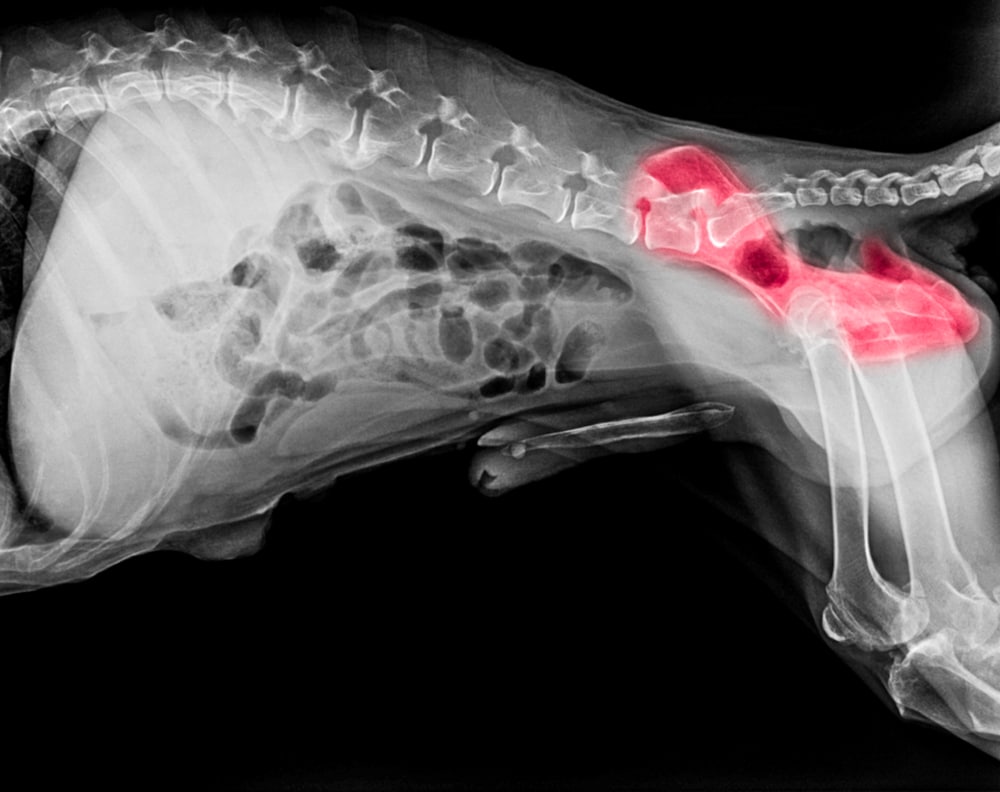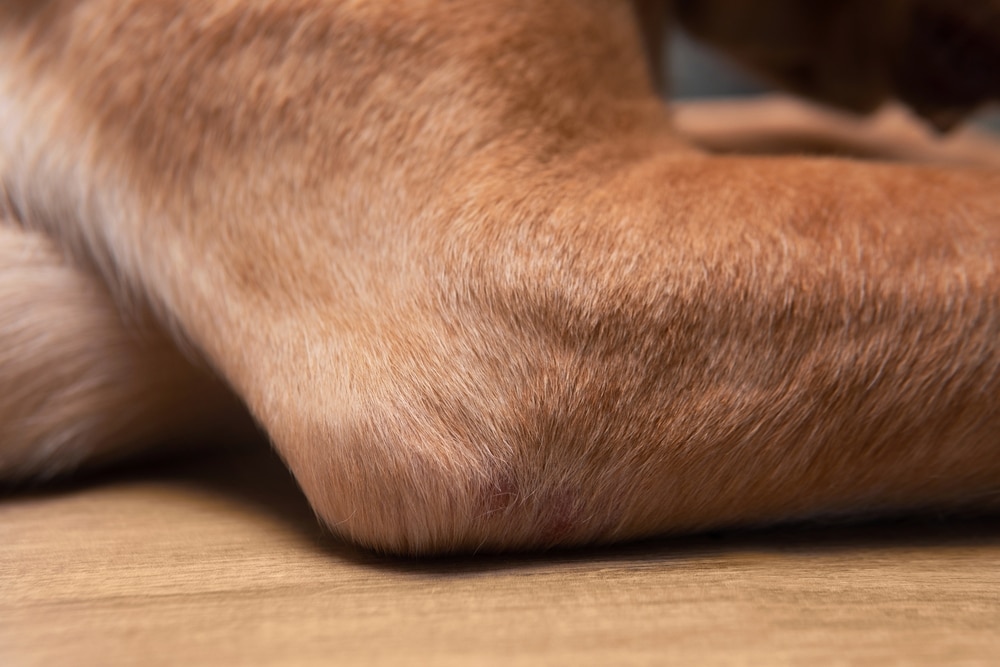Dogs are our best friends, and we want the best for them. But they may experience discomfort from issues such as joint pain. So, how can you take care of your dog if it has joint pain?
Taking care of a dog with joint pain begins with providing supplements, avoiding inflammatory ingredients, and maintaining a healthy weight. Moreover, physical therapy, like exercise and providing a comfy dog bed, anti-slip rugs, and dog can also be helpful.
Table of Contents
What Is Joint Pain?
Joint pain in dogs is a common ailment that can affect many breeds. It may be caused by a joint injury, wear-and-tear, or an underlying medical condition such as hip dysplasia or osteoarthritis.
Moreover, your dog might suffer from two joint issues: degenerative and developmental. Also, both can cause extreme discomfort for your pet if left untreated.
In addition, symptoms like limping, reduced mobility and walking difficulties, decreased appetite, and depression (or even aggression) can be signs of joint pain.
So, it is important to recognize these early on and start treatment quickly to improve your dog’s quality of life.
How To Take Care Of A Dog With Joint Pain?

Taking care of a dog with joint pain can be both difficult and rewarding. It’s an issue that affects many aging dogs, causing difficulty in everyday activities. However, there are plenty of ways to help ease their discomfort and keep them comfortable. So, here are some tips for taking care of a dog with joint pain.
Make Your Home Suited To Dog’s Needs
There are various methods to make your house safer for a dog suffering from joint discomfort, including the following.
Providing Ramps Or Staircases
Because dogs with joint discomfort may have trouble climbing stairs, installing ramps or staircases can help them navigate around the house.
Use Nonslip Flooring
Hardwood, tile, and other slippery floors can be problematic for dogs with joint problems. So, using non-slip flooring or rugs in places where your dog spends most of the time will help reduce slips and falls.
Make A Comfy Bed
Dogs with joint discomfort will love a comfortable bed with joint support. So, memory foam beds and orthopedic beds are excellent choices to explore.
Make Their Living Space Clutter-Free
Dogs with joint discomfort may find it difficult to move about in a cluttered living space. Keep obstructions out of the locations where your dog spends the most time.
Regulate The Temperature Of Your House Regularly
Dogs with joint pain may feel more at ease in a warm atmosphere, which can help to ease stiffness and discomfort.
Consider Using A Dog Wheelchair
If your dog’s movement is severely limited due to joint discomfort, a dog wheelchair can assist them in moving more freely.
Manage Your Dog’s Weight
Weight loss might be beneficial to a dog suffering from joint discomfort. Excess weight can strain the joints, worsening joint discomfort, and inflammation. Maintaining a healthy weight can assist in decreasing joint stress and enhance mobility and the general quality of life in your dog.
Weight loss can aid a dog with joint discomfort in the following ways.
Alleviate Pain
Excess weight can cause inflammation in the body, exacerbating joint discomfort. Maintaining a healthy weight can aid in the reduction of inflammation and the improvement of joint health.
Increase Mobility
Extra weight makes it harder for a dog to move about and causes them to exhaust more quickly. Increase your dog’s mobility and lessen the chance of injury by keeping a healthy weight.
Slow The Course Of Arthritis
Arthritis is a degenerative disease that can worsen with age and obesity. You can help delay the course of arthritis and lower your risk of developing other joint disorders by keeping a healthy weight.
Physical Therapy
Physical therapy can be an excellent technique to aid a dog suffering from joint pain. This is a type of rehabilitation that use exercises, massage, and other treatments to aid with mobility, pain reduction, and injury prevention. A dog suffering from joint discomfort might benefit from a variety of physical therapy. Here are a couple of such examples.
Hydrotherapy
This is also known as aquatic therapy, and it employs water resistance to aid dogs suffering from joint discomfort. Swimming or walking in water can help relieve joint tension and enhance the range of motion.
Massage
This can assist dogs with joint discomfort, decrease inflammation, enhance circulation, and relieve muscular tension.
Physical Rehabilitation Activities
These types of activities, such as range of motion exercises, stretching, and strengthening exercises, can aid in improving mobility, reducing discomfort, and increasing muscular support around the damaged joint.
Low-Level Laser Therapy
This is a non-invasive treatment that employs light energy to relieve inflammation, discomfort, and edema.
Acupuncture
This is an ancient Chinese technique, and it involves the insertion of fine needles to trigger specific points on the body. This can assist dogs with joint problems by lessening pain and enhancing movement.
Therapeutic Ultrasound
This employs sound waves to give deep heat to the damaged joint, which can help relieve pain and inflammation.
Give Supplements
Supplements for joint pain in dogs can help them manage the symptoms and improve their quality of life. These supplements can help dogs move around and engage in daily activities by reducing inflammation and improving mobility. Some of these supplements are given here.
Glucosamine
This is one of the best supplements for dogs with joint pain. Studies have shown that it promotes the formation of new cartilage cells and aids in the rebuilding and repair of this cartilage. This can assist in enhancing the joint’s general health, decreasing inflammation, and relieving discomfort.
Chondroitin Sulfate
This can be an effective supplement for controlling joint discomfort in dogs by reducing inflammation, regenerating and repairing cartilage, and enhancing joint lubrication. It is frequently combined with glucosamine as a part of a complete care plan for dogs suffering from joint discomfort.
CBD (Cannabidiol)
This is a cannabis-derived chemical proven to have pain-relieving qualities. It is increasingly used as a supplement to treat joint pain symptoms in dogs. CBD may be a useful supplement for dogs suffering from joint discomfort since it can assist in decreasing inflammation and pain.
Omega-3 Fatty Acids
These are valuable supplements for controlling joint discomfort in dogs by reducing inflammation, decreasing the course of joint degeneration, and increasing overall joint health.
Green-Lipped Mussel (Glm)
This is a native New Zealand shellfish that has long been used as a natural cure for joint discomfort in people and animals. It is high in Omega-3 fatty acids and glycosaminoglycans (GAGs), which assist in lubricating joints and keep cartilage healthy. GLM supplements are available in powder, pill, and liquid extract formats.
Avoid Inflammatory Ingredients In Your Dog’s Diet
Certain foods can cause inflammation, resulting in increased joint discomfort in dogs. Some inflammatory meals that may cause joint discomfort in dogs to include the following.
Processed Meals
They are high in refined sugars and artificial chemicals, which can lead to inflammation in the body. Commercial dog diets, snacks, and treats high in refined sugars should be avoided since they might raise inflammation and aggravate joint discomfort.
Grains
Grains, including wheat, rye, maize, and soy, contain gluten which can cause inflammation and exacerbate joint pain.
Vegetable Oils
Omega-6 fatty acids, which are pro-inflammatory, are abundant in vegetable oils such as soybean oil, maize oil, and canola oil. They can worsen joint pain and discomfort.
Dairy Items
Dairy products, including milk, cheese, and yogurt, contain the protein Casein which can cause inflammation and joint discomfort.
Red Meat
Saturated fats in red meat, particularly processed meats like sausages and bacon, might lead to inflammation in the body.
Use A Commercial Dog Food Made For Joint Pain
Commercial dog diets created only for joint health are intended to give the nutrients and minerals to improve joint health and reduce inflammation. These foods may include glucosamine, chondroitin, omega-3 fatty acids, and antioxidants to help with joint health. Some of these foods may also be designed with a lower calorie count to aid with weight management.
In Conclusion: How To Take Care Of A Dog With Joint Pain
We want the best life for our furry friends, so it is inevitable to take the necessary steps for their well-being. Whether it is providing supplements or avoiding inflammatory ingredients, or taking your dog to therapies. Whatever it is, it is part of our continued effort to make the lives of our pets less stressful and more enjoyable.
So, what do you plan to do to take care of a dog with joint pain? Let us know in the comments below!
